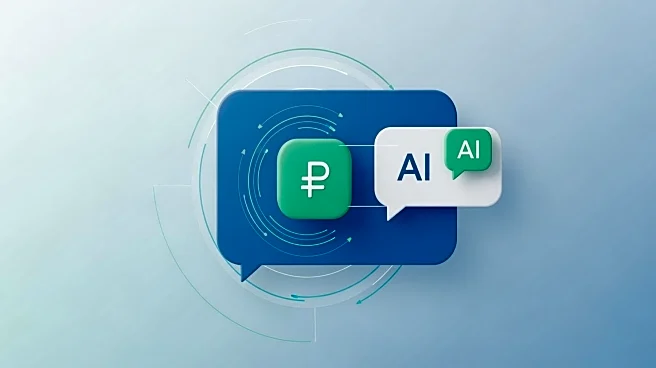What's Happening?
PayPal has entered into a strategic partnership with OpenAI to integrate its digital wallet into ChatGPT, a leading consumer AI tool. This collaboration will allow PayPal users to purchase items directly
through ChatGPT, while merchants can list and sell their inventory on the platform. According to PayPal CEO Alex Chriss, this integration will provide a secure and seamless checkout experience for PayPal's hundreds of millions of wallet holders. The initiative is part of OpenAI's broader effort to expand ChatGPT's capabilities in the e-commerce sector, following recent partnerships with Shopify, Etsy, and Walmart. PayPal aims to establish itself as a key player in the emerging field of agentic AI shopping, having also secured deals with Google and AI firm Perplexity. The company will handle merchant routing, payment validation, and other backend processes, ensuring a streamlined experience for both consumers and merchants.
Why It's Important?
This partnership marks a significant step in the evolution of e-commerce, as it leverages artificial intelligence to enhance the shopping experience. By integrating PayPal's payment system into ChatGPT, the collaboration could revolutionize how consumers interact with online marketplaces, offering a more personalized and efficient shopping process. For PayPal, this move positions the company as a central figure in the future of AI-driven commerce, potentially increasing its user base and transaction volume. Merchants benefit from access to a vast network of verified consumers, reducing fraud risk and expanding their market reach. This development could also influence other payment and e-commerce platforms to explore similar integrations, driving innovation and competition in the industry.
What's Next?
As the integration rolls out next year, stakeholders will be closely monitoring its impact on consumer behavior and merchant sales. PayPal and OpenAI may explore further enhancements to the platform, potentially incorporating more advanced AI features to improve user experience. The success of this partnership could prompt other tech and financial companies to pursue similar collaborations, accelerating the adoption of AI in e-commerce. Additionally, regulatory bodies may scrutinize such integrations to ensure consumer protection and data privacy, potentially influencing future policy developments in the fintech and AI sectors.









